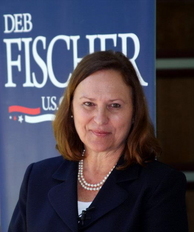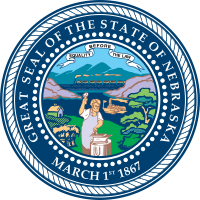Fischer Edges Bruning in 2nd Closest Nebraska GOP US Senate Primary in History
Only Hugh Butler’s 3.3-point victory in 1940 was more narrowly decided than the Cornhusker Republican Senate contest on Tuesday out of 37 contests since 1916

Fischer, who was endorsed by Sarah Palin in the closing days of the campaign and had inched ahead in the polls, not only upset Bruning, but did so in one of the closest races in state history.
A Smart Politics review of the 37 Republican U.S. Senate primaries in Nebraska since the introduction of direct elections nearly 100 years ago finds that the 5.2-point victory by Deb Fischer on Tuesday was the second narrowest margin in Cornhusker State history.
Fischer won with 41.1 percent of the vote compared to 35.9 percent for Bruning, followed by 18.8 percent for State Treasurer Don Stenberg, 2.8 percent for Pat Flynn, 0.8 percent for Spencer Zimmerman, and 0.7 percent for Sharyn Elander.
Prior to Tuesday, the average margin of victory in GOP U.S. Senate primaries was 45.5 points dating back to the first such contest in 1916.
On only three previous occasions was a GOP U.S. Senate primary decided by single digits:
· In 1916, in the state’s first such Senate primary after the introduction of direct elections, John Kennedy edged Chester Aldrich by 7.2 points, 53.6 to 46.4 percent in a two-candidate race.
· In 1940, the closest ever race for a Republican primary took place when Hugh Butler defeated Arthur Weaver by just 3.3 points, 37.2 percent to 33.9 percent in a five-candidate field.
· In 1988, Dave Karnes beat Hal Daub by 9.8 points, 54.8 to 45.0 percent in a two-candidate race.
The six-candidate field Tuesday was not the largest in state history for the GOP – being equaled or eclipsed five other times in Republican U.S. Senate primaries:

In the 1954 primary for the full term of that same seat, Carl Curtis won a seven-candidate race with 39.4 percent of the vote on the way to his first of four terms.
Six-candidate Republican primaries also took place in 1922 (won by Ralph Howell), 1984 (won by Nancy Hoch), and 2000 (won by Don Stenberg).
Stenberg, the State Treasurer and former Nebraska Attorney General, had vied for the nomination on three previous occasions, losing to Chuck Hagel in a two-candidate race in 1996 with 37.5 percent of the vote, winning with 50.0 percent in a six-candidate field in 2000, and losing to Peter Ricketts in 2006 with 35.8 percent in a two-candidate contest.
A Nebraska Republican U.S. Senate nominee has received a free pass to the general election ballot just six times in state history: Carl Curtis in 1954, 1960, and 1966, Roman Hruska in 1954 (special) and 1958, and Chuck Hagel in 2002.
Fischer will face former two-term Democratic U.S. Senator Bob Kerrey, who easily won his party’s primary with over 80 percent of the vote.
Nebraska Republican U.S. Senate Primary Winners and Victory Margin, 1916-2012
|
Year
|
Winner
|
%
|
2nd Place
|
%
|
MoV
|
# Candidates
|
|
2012
|
Deb Fischer
|
41.1
|
Jon Bruning
|
35.9
|
5.2
|
6
|
|
2008
|
Mike Johanns
|
78.0
|
Pat Flynn
|
22.0
|
56.0
|
2
|
|
2006
|
Peter Ricketts
|
48.0
|
Don Stenberg
|
35.8
|
12.2
|
3
|
|
2002
|
Chuck Hagel
|
100.0
|
(unopposed)
|
0.0
|
100.0
|
1
|
|
2000
|
Don Stenberg
|
50.0
|
Scott Moore
|
21.8
|
28.2
|
6
|
|
1996
|
Chuck Hagel
|
62.2
|
Don Stenberg
|
37.5
|
24.7
|
2
|
|
1994
|
Jan Stoney
|
86.3
|
Otis Glebe
|
13.6
|
72.7
|
2
|
|
1990
|
Hal Daub
|
91.3
|
Otis Glebe
|
8.4
|
82.9
|
2
|
|
1988
|
Dave Karnes
|
54.8
|
Hal Daub
|
45.0
|
9.8
|
2
|
|
1984
|
Nancy Hoch
|
40.5
|
John DeCamp
|
16.4
|
24.1
|
6
|
|
1982
|
Jim Keck
|
66.0
|
Ken Cameron
|
33.8
|
32.2
|
2
|
|
1978
|
Donald Shasteen
|
78.4
|
Lenore Etchison
|
21.5
|
56.9
|
2
|
|
1976
|
John McCollister
|
78.4
|
Richard Proud
|
21.6
|
56.8
|
2
|
|
1972
|
Carl Curtis
|
74.0
|
Ronald Blauvelt
|
15.8
|
58.2
|
4
|
|
1970
|
Roman Hruska
|
85.5
|
Otis Glebe
|
14.3
|
71.2
|
2
|
|
1966
|
Carl Curtis
|
99.8
|
(unopposed)
|
0.1
|
99.8
|
1
|
|
1964
|
Roman Hruska
|
99.6
|
(unopposed)
|
0.0
|
99.6
|
1
|
|
1960
|
Carl Curtis
|
99.7
|
(unopposed)
|
0.0
|
99.7
|
1
|
|
1958
|
Roman Hruska
|
100.0
|
(unopposed)
|
0.0
|
100.0
|
1
|
|
1954
|
Carl Curtis
|
39.4
|
Robert Crosby
|
26.7
|
12.7
|
7
|
|
1954 (s)
|
Roman Hruska
|
99.8
|
(unopposed)
|
0.0
|
99.8
|
1
|
|
1954 (s)
|
Hazel Abel
|
22.6
|
Richard Dempster
|
9.7
|
12.9
|
16
|
|
1952 (s)
|
Dwight Griswold
|
81.3
|
Walter Nielsen
|
15.9
|
65.4
|
3
|
|
1952
|
Hugh Butler
|
57.8
|
Val Peterson
|
42.2
|
15.6
|
2
|
|
1948
|
Kenneth Wherry
|
83.5
|
Joseph Bovey
|
16.4
|
67.1
|
2
|
|
1946
|
Hugh Butler
|
63.8
|
Dwight Griswold
|
35.1
|
28.7
|
3
|
|
1942
|
Kenneth Wherry
|
74.5
|
Hugh Ashmore
|
16.9
|
57.6
|
3
|
|
1940
|
Hugh Butler
|
37.2
|
Arthur Weaver
|
33.9
|
3.3
|
5
|
|
1936
|
Robert Simmons
|
71.2
|
Harry Palmer
|
19.6
|
51.6
|
5
|
|
1934 (s)
|
J.H. Kemp
|
44.6
|
Dana Van Dusen
|
27.9
|
16.7
|
4
|
|
1934
|
Robert Simmons
|
46.3
|
Kenneth Wherry
|
24.9
|
21.4
|
5
|
|
1930
|
George Norris
|
57.3
|
W.M. Stebbins
|
39.3
|
18.0
|
3
|
|
1928
|
Ralph Howell
|
59.3
|
O.S. Spillman
|
40.7
|
18.6
|
2
|
|
1924
|
George Norris
|
60.6
|
Charles Sloan
|
25.9
|
34.7
|
3
|
|
1922
|
Ralph Howell
|
34.0
|
Albert Jeffries
|
21.9
|
12.1
|
6
|
|
1918
|
George Norris
|
35.9
|
Charles Sloan
|
25.8
|
10.1
|
5
|
|
1916
|
John Kennedy
|
53.6
|
Chester Aldrich
|
46.4
|
7.2
|
2
|
Table compiled by Smart Politics with official election returns data from the Nebraska State Canvassing Board.
Follow Smart Politics on Twitter.
